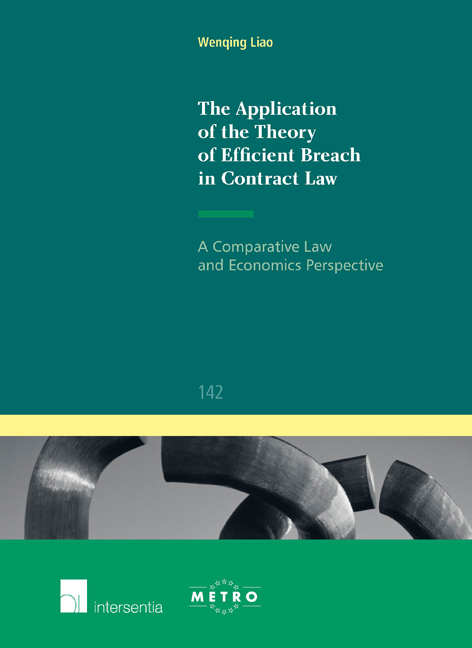 The Application of the Theory of Efficient Breach in Contract Law
The Application of the Theory of Efficient Breach in Contract Law Published online by Cambridge University Press: 12 December 2017
In law and economics, the theory of efficient breach arises from a situation where non-performance of a contract, compared to its performance, might produce higher payoffs to the parties after the contract has been concluded. Under this situation, it is assumed that non-performance of the contract is economically more desirable than performance. Breach is one of the approaches to realizing non-performance. In order to achieve non-performance, the party who has to perform (promisor, obligor or seller) could either breach the contract or negotiate with the other party for a release from the contract. If the party contemplating breach is able to take the benefit and the cost of breach into account, he will breach only when the profit of doing so is higher than other choices. His choice of breach is considered to be efficient as long as he could still make profits after paying damages and the damages he pays could put the non-breaching party in as good a position as he could enjoy had the contract been performed.
The central question in this thesis is to what extent the sales law in different legal systems can promote efficient breach and efficiency. Efficiency is the central concept for evaluating remedy rules in different legal systems. In the real world, it is costly for contracting parties to draft perfect contracts ex-ante, which have considered all possible risks, as well as the other party's opportunistic behaviour that might occur after the conclusion of the contract. By the same token, achieving settlements ex-post might also be discouraged by the high negotiation costs. By providing various default rules as well as mandatory rules in relation to different risks, contract law may thus facilitate transactions for instance by filling the contract gap, disambiguating contract terms, motivating efficient behaviour as well as preventing opportunistic behaviour. According to the efficient breach theory, efficient contract rules should enable contracting parties to behave efficiently, for example to only breach a contract when it is efficient to do so but otherwise to take proper measures of performing their contract. This thesis focuses on how different contract law rules shape a seller's incentives to breach efficiently, or more broadly, to take efficient solutions in the situation when strictly performing a sales contract is less efficient than not performing it.
To save this book to your Kindle, first ensure [email protected] is added to your Approved Personal Document E-mail List under your Personal Document Settings on the Manage Your Content and Devices page of your Amazon account. Then enter the ‘name’ part of your Kindle email address below. Find out more about saving to your Kindle.
Note you can select to save to either the @free.kindle.com or @kindle.com variations. ‘@free.kindle.com’ emails are free but can only be saved to your device when it is connected to wi-fi. ‘@kindle.com’ emails can be delivered even when you are not connected to wi-fi, but note that service fees apply.
Find out more about the Kindle Personal Document Service.
To save content items to your account, please confirm that you agree to abide by our usage policies. If this is the first time you use this feature, you will be asked to authorise Cambridge Core to connect with your account. Find out more about saving content to Dropbox.
To save content items to your account, please confirm that you agree to abide by our usage policies. If this is the first time you use this feature, you will be asked to authorise Cambridge Core to connect with your account. Find out more about saving content to Google Drive.